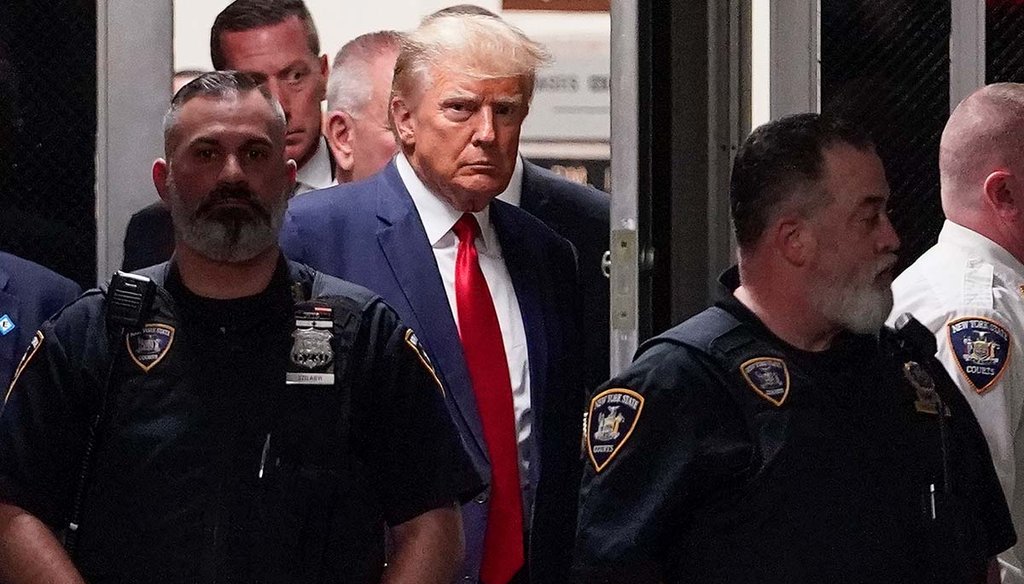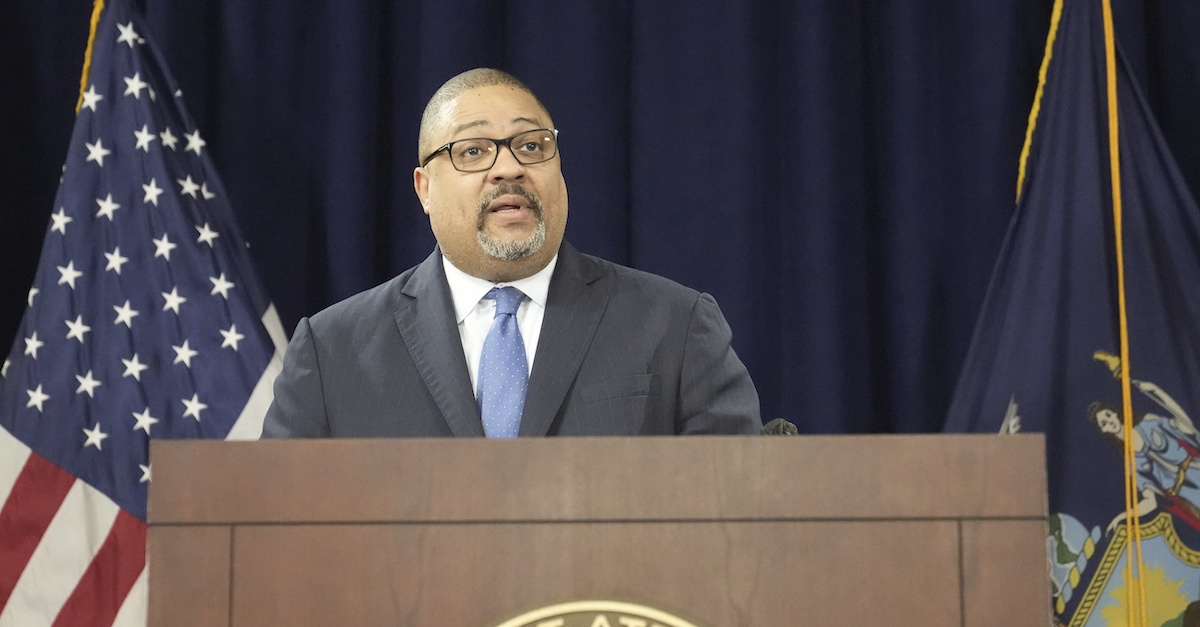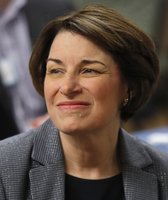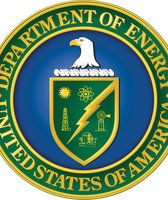Get PolitiFact in your inbox.

Former President Donald Trump is escorted to a courtroom April 4, 2023, in New York. (AP)
Donald Trump has achieved many firsts. The first president to be impeached twice. The first president to inspire a riot at the Capitol seeking to stop the peaceful transfer of power. And on April 4 he added a new one: the first former president to face criminal charges.
Trump pleaded not guilty to 34 felony counts of falsifying business records in the first degree during a court appearance in lower Manhattan that was not televised. The charges from a grand jury stem from a payment to adult film actor Stormy Daniels before the 2016 election, as well as attempts to buy the silence of two other people. Manhattan District Attorney Alvin Bragg said Trump improperly funded the payoff as a business expense and called it evidence of a broader practice of "catch and kill," in which people were paid to silence their stories about Trump.
A grand jury indictment does not mean a defendant is guilty. That must be proven to a 12-member jury beyond a reasonable doubt.
We answered questions about what the charges mean and what challenges the district attorney may encounter.
What is the crime of falsifying business records?
The crime of falsifying business records is included in New York’s penal code. Falsifying records in the second degree is a misdemeanor, but it becomes a felony if the person falsified business records with an intent to commit another crime or to aid or conceal the commission of a crime.
Sign up for PolitiFact texts
Bragg used the felony statute to charge Trump 34 times. The number of charges refers to 34 documents the grand jury found to have contained a "critical false statement" related to the payments. These documents include checks written to Michael Cohen, Donald Trump’s former lawyer, as payments for legal services over a nine-month period when Trump was running for president. Bragg said these payments were for nonbusiness reasons.
"Why did Donald Trump repeatedly make these false statements? The evidence will show that he did so to cover up crimes relating to the 2016 election," Bragg said in a press conference after the arraignment.
What is the second crime prosecutors may pursue?
The indictment and a related "statement of facts" in the case do not name the second crime that turns the misdemeanor records charge into a felony.
During the press conference, Bragg said the law does not require him to specify those laws in the indictment, but he threw out a few laws that might apply.
First, Bragg said it is against New York election law to "conspire to promote a candidacy by unlawful means." The Daniels payment happened before the 2016 presidential election that Trump won.
Bragg also suggested prosecutors are examining statements intended to "evade the tax authorities" and federal election law campaign contribution limits.
Prosecutors must ultimately explain the other, so-far unspecified crimes, said Steve Friedland, a law professor at Elon University and a former federal prosecutor.
Duncan Levin, a criminal defense attorney who worked in the Manhattan district attorney’s office before Bragg’s tenure, criticized Bragg for not citing the specific statutes that bumped the misdemeanor charges to felonies.
"I think it is way too bare-bones," Levin said. "Maybe the DA is trying to keep all options open, but it’s not sufficient to say he doesn’t have to at this stage."
Why does the indictment include 34 charges?
Prosecutors have leeway in structuring the charges in an indictment. In the Trump case, each check or business record is charged separately.
Legal experts said 34 is a large number of charges, but not unheard of.
In Trump’s case, "each of the multiple payments is being charged in multiple ways," said Ric Simmons, a law professor at Ohio State University’s Moritz College of Law. "This is a legitimate method of charging business fraud cases, but it makes for a more dramatic indictment."
Manhattan District Attorney Alvin Bragg briefing reporters April 4, 2023, after former President Donald Trump’s arraignment in New York City. (AP)
How common is the crime of falsifying business records?
After Trump left the courthouse, one of his lawyers, Joe Tacopina, told reporters, "If this man's name was not Donald J. Trump, there's no scenario we'd all be here today."
Levin said he doesn’t buy that narrative, because the charge for falsifying business records is common.
Since Bragg took office in 2022, prosecutors have filed 117 felony counts of the charge against 29 people and companies, according to The New York Times, which cited data kept by the district attorney’s office.
"It is the bread and butter of the office, by and large brought against people you have never heard of," Levin said.
How did prosecutors go beyond financial records?
The district attorney’s office released two documents: an indictment that recites each count, and a statement of facts, which is written in more of a narrative style.
The latter document attempts to show how the evidence of falsified business records speaks to a bigger effort to conceal negative stories before the election.
"From August 2015 to December 2017, the Defendant orchestrated a scheme with others to influence the 2016 presidential election by identifying and purchasing negative information about him to suppress its publication and benefit the Defendant’s electoral prospects," the statement said.
The counts radiated outward from the payoff to Daniels, but the documents also addressed Karen McDougal, a former Playboy model who said she had an affair with Trump.
Prosecutors are "saying this was a concerted effort, a group effort, to ‘catch and kill’ stories in different ways," Friedland said.
The indictment also alleged an intention to make false statements on taxes.
The document said an unnamed Trump Organization lawyer — Cohen — paid $130,000 to an adult film actor shortly before the election to prevent her from publicizing a sexual encounter with Trump. Bragg doesn’t name "lawyer A" or the woman, but the descriptions make clear they are Cohen and Daniels. Cohen, who pleaded guilty to making an illegal campaign contribution and served time in prison, made the payment through a shell corporation he set up and funded at a bank in Manhattan.
After the election, the indictment says, Trump reimbursed Cohen through a series of monthly checks, first from a Trump trust connected to his business and then from Trump’s bank account. Each check was processed by the Trump Organization and the records produced were false, according to the district attorney’s statement.
Why did prosecutors bring up the National Enquirer?
The statement explains the National Enquirer tabloid’s role in a "catch and kill" scheme to keep "damaging" stories about Trump from being published before the 2016 presidential election.
American Media, the company that owned the National Enquirer, said in a nonprosecution agreement that it paid a source of a story to ensure that the source "did not publicize damaging allegations" about Trump before the election that might swing the outcome.
In August 2015, two months after Trump announced his candidacy, Trump met with Cohen and the American Media CEO at Trump Tower. The indictment doesn’t name the CEO but at the time it was David Pecker. He agreed to watch for negative stories about Trump and alert Cohen before publishing.
In fall 2015, American Media agreed to pay $30,000 for a story, peddled by a former Trump Tower doorman, that alleged Trump had fathered a child out of wedlock. The company later learned the story was false.
Around June 2016, the editor-in-chief of the National Enquirer and American Media’s chief content officer contacted Cohen about an unnamed woman, believed to be McDougal, who said she had a sexual relationship with Trump. American Media paid the woman $150,000 for her silence and for two cover features about her.
In a September 2016 conversation captured on audio, Trump and Cohen discussed how to obtain the rights to the unnamed woman’s account from American Media and reimburse American Media for its payment.
On the recording, Trump asked, "So what do we got to pay for this? One fifty?" and suggested paying by cash. Trump mentioned payment by check and Cohen created a shell company and later paid the woman $125,000.
In summer of 2017, Trump "invited the (American Media) CEO to the White House for a dinner to thank him for his help during the campaign," the statement of facts said.
What are the biggest challenges prosecutors will face?
Winning over the jury may not be easy. One issue is Cohen, a central figure in the government’s case. "A jury may not trust him because he is a convicted felon, and he perjured himself, and based on statements he may not be neutral regarding the defendant," Friedland said.
Prosecutors will focus on trying to secure an open-minded jury.
"There are supporters of Trump who will never vote to convict him no matter what the evidence shows, even in New York County, and if they make it onto a jury, it will be impossible to secure a conviction," Simmons said.
Prosecutors will have to prove Trump’s intent, which is a key issue in many white collar cases, said Ellen Podgor, a law professor and expert on white collar crime at Stetson Law.
"It is particularly a problem for the government when your key witness has a prior conviction and therefore credibility issues," Podgor said.
Finally, prosecutors will need to navigate tricky state and federal issues around campaign laws.
"It is far from clear that Trump could be liable for state campaign finance crimes as a federal candidate," wrote Rick Hasen, a UCLA professor who specializes in election law.
A "preemption" rule may preclude state prosecutors from pursuing charges against a federal candidate for federal crimes, he wrote.
What’s next in the case?
Bragg will have 15 days to provide discovery to Trump’s lawyers. His lawyers will file motions, including a request for a change of venue.Trump’s lawyers could try to get the case moved to federal court. Even if that argument gets rejected it could "buy himself a detour" for a while, Levin said.
Levin said he doubts the case will be moved out of Manhattan. The court can make a distinction that although most Manhattan residents don’t want Trump elected again as president, jurors can judge the evidence on their own accord and hear the case fairly.
Staff Writer Grace Abels and Staff Researcher Caryn Baird contributed to this report.
RELATED: Donald Trump indictment: A roundup of PolitiFact’s fact-checks, stories and explainers
Our Sources
Judge Juan M. Merchan, Ruling on access to courtroom, April 3, 2023
Supreme Court of the state of New York, Indictment against Donald Trump, unsealed April 4, 2023
Manhattan DA Alvin Bragg, Press release and statement of facts about Trump indictment, April 4, 2023
New York State Unified Court System, Types of criminal cases, Accessed April 4, 2023
UCLA law professor Rick Hasen in Slate, Donald Trump Probably Should Not Have Been Charged With (This) Felony, April 4, 2023
New York Times, Here are the legal intricacies that could make or break the case against Trump. March 21, 2023
Just Security, The Manhattan DA’s Charges and Trump’s Defenses: A Detailed Preview, March 20, 2023
Just Security, Survey of Past New York Felony Prosecutions for Falsifying Business Records, March 21, 2023
ABC News, How the Trump hush money case compares to the John Edwards indictment, March 24, 2023
Politico, Edwards case: Mistrial, June 1, 2012
CNN, John Edwards admits he fathered child with mistress, Jan. 21, 2010
National File, Just 10% of Manhattan Residents Voted for Anti-Trump DA in 2021 Election, March 20, 2023
Politico, He already rocked MAGA world — twice. Now he’s Trump’s judge. April 3, 2023
Kimberly Wehle for The Bulwark, The Trump Investigation You Probably Haven’t Heard About, March 20, 2023
CNBC, Manhattan DA Alvin Bragg gets death threat with powder after Trump warns of probe-related violence, March 24, 2023
ABC News, How the Trump hush money case compares to the John Edwards indictment, March 24, 2023
New York state laws, 175.05 and 175.10, Accessed April 3, 2023
Western New England University law professor Jennifer Taub, Tweet, March 23, 2023
Department of Justice, Former Senator and Presidential Candidate John Edwards Charged for Alleged Role in Scheme to Violate Federal Campaign Finance Laws, June 11, 2011
ABC News, Edwards Admits Sexual Affair; Lied as Presidential Candidate, July 24, 2008
Rev.com, Donald Trump Hosts First 2024 Presidential Campaign Rally in Waco, Texas Transcript, March 27, 2023
Donald Trump’s Truth Social, Post, March 27, 2023
Donald Trump’s Truth Social, Post, April 2, 2023
Fivethirtyeight, How Trump’s Indictment Could Affect The 2024 Election, March 31, 2023
New York Law Journal, Judge Juan Merchan, Accessed April 4, 2023
NPR, Former President Donald Trump's company is found guilty of criminal tax fraud, Dec. 6, 2022
Manhattan DA, Press release about Trump Organization fine, Jan. 13, 2023
Manhattan DA, Press release about Weisselberg sentence, Jan. 10, 2023
Donald Trump, Truth Social, April 4, 2023
Interview with Stanley Brand, election law criminal law specialist and distinguished fellow in law and government at Penn State Dickinson Law, April 3-4, 2023
Email interview with Stephen Gillers, NYU School of Law professor emeritus, April 4, 2023
Interview with Steve Friedland, law professor at Elon University and a former federal prosecutor, April 3-4, 2023
Interview with Duncan Levin, criminal defense attorney and former federal prosecutor and former senior staff of the Manhattan District Attorney’s Office, April 3-4, 2023
Email interview with James Robenalt, attorney with the firm Thompson Hine and an expert on the Watergate scandal, April 4, 2023
Email interview with Ric Simmons, law professor at Ohio State University’s Moritz College of Law, April 4, 2023
Email interview, Ellen Podgor, Stetson Law white-collar crime research professor of law, April 4, 2023
































